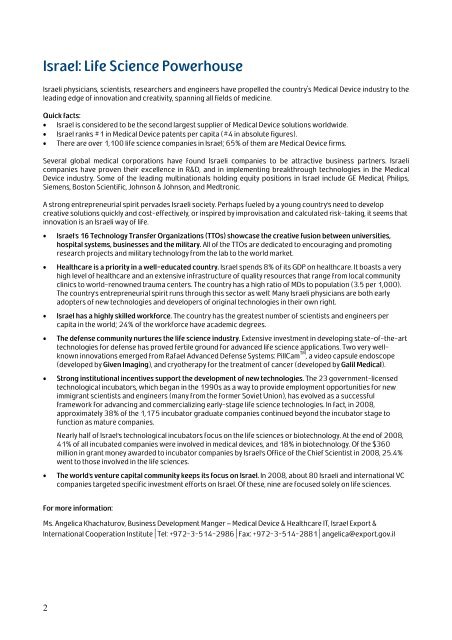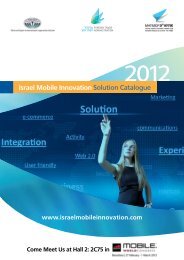Israel Medica2010 Companies Catalogue - Israeli-South African ...
Israel Medica2010 Companies Catalogue - Israeli-South African ...
Israel Medica2010 Companies Catalogue - Israeli-South African ...
You also want an ePaper? Increase the reach of your titles
YUMPU automatically turns print PDFs into web optimized ePapers that Google loves.
<strong>Israel</strong>: Life Science Powerhouse<br />
<strong>Israel</strong>i physicians, scientists, researchers and engineers have propelled the country's Medical Device industry to the<br />
leading edge of innovation and creativity, spanning all fields of medicine.<br />
Quick facts:<br />
• <strong>Israel</strong> is considered to be the second largest supplier of Medical Device solutions worldwide.<br />
• <strong>Israel</strong> ranks #1 in Medical Device patents per capita (#4 in absolute figures).<br />
• There are over 1,100 life science companies in <strong>Israel</strong>; 65% of them are Medical Device firms.<br />
Several global medical corporations have found <strong>Israel</strong>i companies to be attractive business partners. <strong>Israel</strong>i<br />
companies have proven their excellence in R&D, and in implementing breakthrough technologies in the Medical<br />
Device industry. Some of the leading multinationals holding equity positions in <strong>Israel</strong> include GE Medical, Philips,<br />
Siemens, Boston Scientific, Johnson & Johnson, and Medtronic.<br />
A strong entrepreneurial spirit pervades <strong>Israel</strong>i society. Perhaps fueled by a young country’s need to develop<br />
creative solutions quickly and cost-effectively, or inspired by improvisation and calculated risk-taking, it seems that<br />
innovation is an <strong>Israel</strong>i way of life.<br />
• <strong>Israel</strong>’s 16 Technology Transfer Organizations (TTOs) showcase the creative fusion between universities,<br />
hospital systems, businesses and the military. All of the TTOs are dedicated to encouraging and promoting<br />
research projects and military technology from the lab to the world market.<br />
• Healthcare is a priority in a well-educated country. <strong>Israel</strong> spends 8% of its GDP on healthcare. It boasts a very<br />
high level of healthcare and an extensive infrastructure of quality resources that range from local community<br />
clinics to world-renowned trauma centers. The country has a high ratio of MDs to population (3.5 per 1,000).<br />
The country’s entrepreneurial spirit runs through this sector as well: Many <strong>Israel</strong>i physicians are both early<br />
adopters of new technologies and developers of original technologies in their own right.<br />
• <strong>Israel</strong> has a highly skilled workforce. The country has the greatest number of scientists and engineers per<br />
capita in the world; 24% of the workforce have academic degrees.<br />
• The defense community nurtures the life science industry. Extensive investment in developing state-of-the-art<br />
technologies for defense has proved fertile ground for advanced life science applications. Two very wellknown<br />
innovations emerged from Rafael Advanced Defense Systems: PillCam TM , a video capsule endoscope<br />
(developed by Given Imaging), and cryotherapy for the treatment of cancer (developed by Galil Medical).<br />
• Strong institutional incentives support the development of new technologies. The 23 government-licensed<br />
technological incubators, which began in the 1990s as a way to provide employment opportunities for new<br />
immigrant scientists and engineers (many from the former Soviet Union), has evolved as a successful<br />
framework for advancing and commercializing early-stage life science technologies. In fact, in 2008,<br />
approximately 38% of the 1,175 incubator graduate companies continued beyond the incubator stage to<br />
function as mature companies.<br />
Nearly half of <strong>Israel</strong>’s technological incubators focus on the life sciences or biotechnology. At the end of 2008,<br />
41% of all incubated companies were involved in medical devices, and 18% in biotechnology. Of the $360<br />
million in grant money awarded to incubator companies by <strong>Israel</strong>’s Office of the Chief Scientist in 2008, 25.4%<br />
went to those involved in the life sciences.<br />
• The world’s venture capital community keeps its focus on <strong>Israel</strong>. In 2008, about 80 <strong>Israel</strong>i and international VC<br />
companies targeted specific investment efforts on <strong>Israel</strong>. Of these, nine are focused solely on life sciences.<br />
For more information:<br />
Ms. Angelica Khachaturov, Business Development Manger – Medical Device & Healthcare IT, <strong>Israel</strong> Export &<br />
International Cooperation Institute | Tel: +972-3-514-2986 | Fax: +972-3-514-2881 | angelica@export.gov.il<br />
2

















